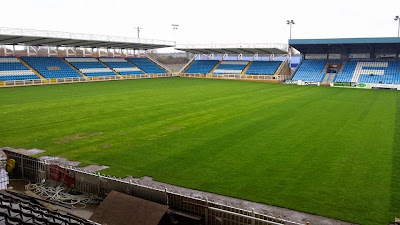When Featherstone Rovers signed Jackie Fennell from
Bagley’s Recs in December 1952, they thought they had signed a future star
stand-off. Although he was to have a long and successful career at Post Office
Road, things didn’t work out that way. A few months later, Peter Fox’s younger
brother Don was signed as a scrum-half. And in the summer of 1953 Rovers took
on another youngster who had grown up on Albert Terrace in Sharlston who was
fifteen months older than Don. Those three signings provided the backbone of one
of Featherstone’s greatest sides.
Joe Mullaney played a single game as an unnamed
trialist in a charity match versus Wakefield. He was promptly signed and went
straight into the first team in August 1953 under coach Eric Batten. Within a
month, Joe’s great friend Don had taken over from Tommy Smales and our greatest
half-back partnership ever was formed. The following season Jackie Fennell
slotted into full-back and the backline structure that was to serve the club so
well for so many years was complete.
Joe’s rise to the top was swift. Within a year he
had won county honours for Yorkshire. Within two, his England cap. His
representative career never really took off though, due to some inopportune
injuries and the handicap of playing at an unfashionable club like
Featherstone.
Domestically, Featherstone Rovers carried all before them
under Batten then Harold Moxon. Season after season of high league finishes
were sprinkled with herculean performances in the Challenge Cup which went down
in Rovers folklore. Perhaps the most famous of those was in March 1959 when
more than 17,000 fans jammed into the ground to watch Joe lead his team to a
famous Cup quarter-final victory over St. Helens. Despite their heroics, it is
hard to believe Joe never played at Wembley. His record of four Cup semi-final
defeats in 1955, 58, 59 and 60 is a travesty. In the Yorkshire Cup he managed
to make a final, captaining the side to win the 1959 competition against Hull.
What made Mullaney such a great stand-off? He had pace,
wonderful hands, a side-step, a hand-off and an eye for a gap. He also had a
very quick mind which could read a game. He was a very solid tackler and never
shirked on defence. As club captain, he led by example and was an inspiration
to his team-mates.
In total, Joe played 319 games for Featherstone
Rovers and scored 85 tries. He had his benefit year in 1963, a joint award with
Don Fox, although truth be told both players deserved their own separate years,
such was the service they had given. Injuries forced Joe’s retirement in 1965. Affable,
well-mannered and modest off the field, he remained a very popular figure long
after he had retired. Joe Mullaney died in December 2015 aged 81.




